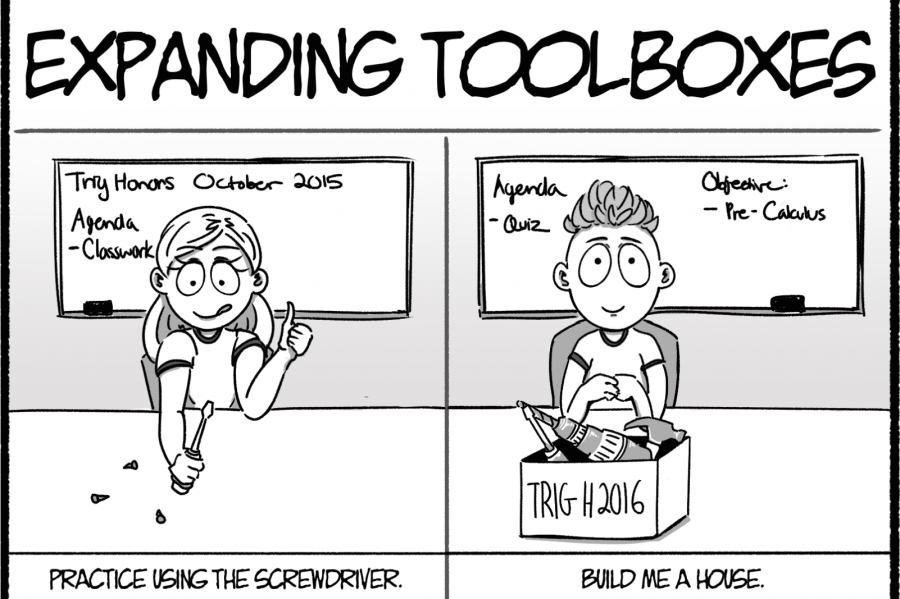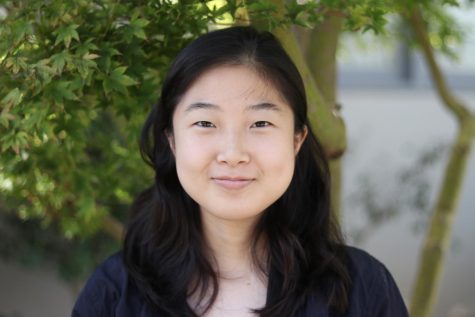Trigonometry Honors Curriculum Accelerates
As a stepping stone between Algebra II and Calculus classes, Trigonometry/Math Analysis Honors has been revamped to better prepare students for calculus. Math teachers Eunice Lee and Stephen Stefanini worked over the summer to craft a new curriculum that aims to emphasize students’ problem-solving and precalculus skills.
When Lee taught Trigonometry Honors for the first time last year, she felt the class left students underprepared because it lacked necessary components for calculus.
“The changes stem from my experience teaching Trigonometry Honors last year for the first time,” Lee said. “I felt that the curriculum was missing certain pieces so I brought those changes [to the math department]. We want [students] to be more prepared for calculus.”
Instead of overlapping trigonometry into the second semester of the course, the course’s new calendar begins precalculus at the start of the second semester.
“They ran trigonometry into February in the past, and kids came [to calculus] without enough math analysis background,” AP Calculus teacher Carol Evans said.
Parametric functions, conics and matrix transformations will also be covered in more depth this year, and students will be given challenge problems and weekly homework quizzes. The course will also feature the addition of a project in the second semester, in which students will pick a research topic related to the course material and present their findings.
These adjustments require a faster pace, and while last year’s curriculum completed the first chapter in three weeks, the new curriculum covered the first chapter in one week.
“Last year a lot of students who signed up for Trigonometry Honors came from Algebra II,” Lee said. “The skills of Algebra II students coming in were really weak, so we needed to spend more time to cater to the students, whereas this year [I feel] the students are coming slightly better prepared.”
According to Lee, the faster pace may have caused more students to drop the course this year. The class is now harder, especially for those who do not have as much experience in an honors math class.
“There were more drops this year,” Lee said. “It’s very normal for students to be dropping honors classes because when [students] sign up they want to challenge themselves, but once [the] first two weeks of school start, you rebalance what’s on your plate.”
Junior Jocelyn Maeyama believes the increased drops came from the unexpected difficulty of the course, as students had based expectations of the class’ pace on the experience of classmates who took the course in previous years.
“The experiences of past students are so different, [so] I feel like it’s added a lot of unexpected stress,” Jocelyn said. “The term ‘honors’ applies really varyingly, so word-of-mouth is really important for students to figure out what course load they want.”
In line with the faster pace, the challenge problems will be similar to those given in Algebra II Honors, and Evans hopes they will foster students’ problem-solving skills.
“Algebra II Honors has always had a problem-solving day, and Lee is starting to do that in Trigonometry Honors,” Evans said. “I [told] Lee that they were not prepared in math analysis, [and] I showed her a website that she used for outside-the-box problems.”
To illustrate this, Evans compared a student’s knowledge and problem-solving skillset to a toolbox. Previously in the course, she says, students were taught to solve familiar problems they had done before but were not taught to choose a problem-solving method given less familiar problems.
“When I gave students a toolbox, they didn’t know if they needed a hammer, a screwdriver or a peg,” Evans said. “They didn’t know how to [choose from] one or the other.”





